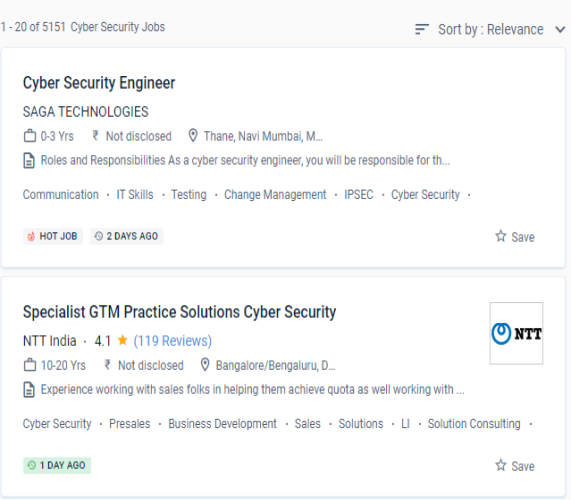Cyber Security Training by Experts
Our Training Process

Cyber Security - Syllabus, Fees & Duration
MODULE 1
- Cyber security
- Importance and challenges of cyber security
- Integrity, availability
- Layers of cybersecurity
MODULE 2
- Types of Malware
- Worms
- Viruses
- Spyware
- Trojans
MODULE 3
- Cyber security fundamentals
- Cyber criminology
- Cyber forensics
MODULE 4
- Cyber security breaches
- Phishing
- Identity Theft
- Harassment
- Cyber stalking
MODULE 5
- Types of cyber-attacks
- Web-based attacks,
- System-based attacks
- Password attack
- Passive attacks
- Denial of service attacks
MODULE 6
- Prevention tips
- Craft a Strong Password
- Two Step Verification
- Download Attachments with Care
- Question Legitimacy of Websites
MODULE 7
- Mobile protection
- No Credit Card Numbers
- Place Lock on Phone
- Do not Save Passwords
- No Personalized Contacts Listed
MODULE 8
- Social network security
- Do not Reveal Location
- Keep Birthdate Hidden
- Have Private Profile
- Do not Link Accounts
MODULE 9
- Prevention software
- Firewalls
- Virtual Private Networks
- Anti Virus and Anti Spyware
- Routine Updates
MODULE 10
- Critical cyber threats
- Cyber terrorism
- Cyber warfare
- Cyber espionage
MODULE 11
- Defence against hackers
- Cryptography
- Digital Forensics
- Intrusion Detection
- Legal Recourse
MODULE 12
- Wrapping up
- Words from the Wise
- Review of Parking Lot
- Lessons Learned
- Completion of Action Plans and Evaluations
This syllabus is not final and can be customized as per needs/updates





 In terms of the business case, cybersecurity protects the company's assets from breaches in its information systems, personal data, and mobile devices. Cyber security is a serious matter, and businesses invest a lot of money to guarantee that their computer systems are secure. To meet your expertise level, NESTSOFT offers a variety of classes ranging from intermediate to advance. Other opportunities include Cybersecurity Architect and Solution Implementation Engineer, among others.
Professional Certificate Program is an option if you are not a novice and are looking for advanced training courses.
To begin with, when it comes to protecting a company's or an individual's valuable resources, cybersecurity is the first line of protection.
. We are seeing cybercriminals use social engineering, with phishing emails attacking millions of emails every day, and hackers attempting to embed dangerous software on websites. It includes threats to hardware, sensitive data protection, computer software, and data protection, as well as theft, hacking, viruses, database attacks, and even new technologies, depending on the type of attack.
If you enjoy programming and problem solving, as well as a fast-paced and challenging career, cybersecurity may be a good fit for you.
In terms of the business case, cybersecurity protects the company's assets from breaches in its information systems, personal data, and mobile devices. Cyber security is a serious matter, and businesses invest a lot of money to guarantee that their computer systems are secure. To meet your expertise level, NESTSOFT offers a variety of classes ranging from intermediate to advance. Other opportunities include Cybersecurity Architect and Solution Implementation Engineer, among others.
Professional Certificate Program is an option if you are not a novice and are looking for advanced training courses.
To begin with, when it comes to protecting a company's or an individual's valuable resources, cybersecurity is the first line of protection.
. We are seeing cybercriminals use social engineering, with phishing emails attacking millions of emails every day, and hackers attempting to embed dangerous software on websites. It includes threats to hardware, sensitive data protection, computer software, and data protection, as well as theft, hacking, viruses, database attacks, and even new technologies, depending on the type of attack.
If you enjoy programming and problem solving, as well as a fast-paced and challenging career, cybersecurity may be a good fit for you.



















































































